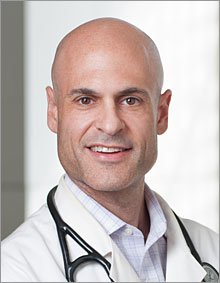Improving Care for Older Adults
News
End-of-Life Care Practices Not Based on Evidence
Penn's Scott Halpern Calls For More Aggressive Research
University of Pennsylvania critical care physician Scott Halpern’s effort to promote the development of better evidence for end-of-life care decisions and practices is the subject of a major story in the Philadelphia Inquirer.
In the article entitled, “Making End-of-Life Care More Scientific,” Halpern was critical of the growing numbers of organizations and services now offering end-of-life care advice and consultations that, he said, are not based on scientific evidence.

‘Sobering facts’
The Inquirer piece is a follow-up interview to Halpern’s recent Perspective article in the New England Journal of Medicine that said “one of the most sobering facts is that no current policy or practice designed to improve the care for millions of dying Americans is backed by a fraction of the evidence the Food and Drug Administration would require to approve even a relatively innocuous drug.”
Halpern, MD, PhD, and LDI Senior Fellow, is the founding Director of Penn’s FIELDS Center (Fostering Improvement in End-of-Life Decision Science). FIELDS is the country’s only dedicated academic program applying principles of behavioral economics research to end-of-life decision making by patients, their families and clinicians. A part of the LDI Center for Health Incentives and Behavioral Economics (CHIBE), FIELDS has roughly 15 affiliated faculty, 8 full-time staff, and more than a dozen pre- and post-doctoral trainees across the University of Pennsylvania.
Good intentions, little evidence
In the Inquirer piece, Halpern noted that many programs currently offering end-of-life support and consulations were organized and are run with good intentions but are using end-of-life practices that are not based on strong scientific evidence.
In his NEJM Perspective Halpern wrote, “It is the responsibility of investigators and research sponsors to identify, develop, and rigorously test interventions so that they can offer guidance as growing political and cultural tolerance increasingly permits implementation of end-of-life care programs.”
The subject of physician-patient discussions about end-of-life care alternatives and living wills (or “advance directives”) has been controversial since “death panel” political hyperbole enveloped the debate surrounding the initial passage of the Affordable Care Act. It’s also been a high-interest topic in the drive to reduce U.S. health costs, given that so much of that spending occurs near the end of life. In its latest 2015 report, the Medicare Payment Advisory Commission (MedPAC) notes that health care costs in the last year of life consume more than 25% of all Medicare spending — a statistic that hasn’t changed in 20 years.
Notoriously disinclined
By training and tradition, doctors have long tended to be notoriously disinclined to broach the subject of death or end-of-life care options with patients or their family members, even though the experience involves such potentially profound consequences for all involved.
In a watershed move a year ago, the Centers for Medicare and Medicaid Services (CMS) authorized a new line of reimbursement for such end-of-life doctor-patient consultations and is urging health care providers to make such discussions a routine part of the care for seriously ill patients.
But in the same way that physicians avoided addressing end-of-life conversations with patients in recent decades, health services researchers similarly were not inclined to take on end-of-life decision science projects. Thus, there is little scientific evidence to guide any of the parties — patient, families or health care providers — who are now being encouraged to deal with the discomforting issue in a more comprehensive manner.
Prognostic guidance
The Inquirer story synopsized several behavioral economics research projects FIELDS has undertaken since its founding in 2012. One in-progress study’s preliminary finding is that doctors and nurses are better then they think at predicting long-term patient outcomes, and this could motivate them to more actively share prognostic guidance with patients and families.
Another FIELDS project begins this summer as it collaborates with the nationwide Ascension Health System to transition that 11-hospital network to a new way of discussing palliative care with patients. The old way required patients or doctors to first bring up the subject. The new way has Ascension automatically offering palliative care consultations for seriously ill patients meeting certain criteria.
Halpern told the Inquirer that one of FIELDS goals is to find new and more effective ways to measure the quality of care given at the end of life.
More accurate measures
Addressing this same point in NEJM, he wrote “It’s important to reach a consensus regarding which outcome measures to use in studies designed to quantify the efforts of interventions near the end of life. Isolated measures of survival, place of death, or costs of care are important but insufficient.”
Halpern also noted that the National Institutes of Health and the Patient-Centered Outcomes Research Institute (PCORI) have recently shown “greater interest in supporting large, pragmatic trials of scalable (end-of-life care) interventions.” He suggests that researchers, research sponsors, large employers and health systems take advantage of that interest “before the lack of demonstrable return on investment or the need to focus on other matters dampens policymakers’ current enthusiasm.”
Related Articles
Surprise Results of 7-Country End-of-Life Study
Penn-Led Analysis Finds Elderly U.S. Cancer Patients Least Likely To Die In Hospital